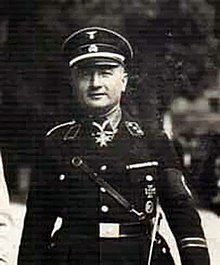Gustav von Wulffen

Gustav Adolf von Wulffen (born April 18, 1878 in Gotha ; † May 4, 1945 in Borkheide ) was a German officer , most recently major general and SS brigade leader .
origin
He comes from the Prussian noble family von Wulffen . His parents were Lieutenant General Gustav Adolf Alexander Ferdinand von Wulffen (1833–1902) and his wife Klara Wilhelmine Christiane Hauff (1845–1910).
Life
Gustav Adolf resigned after his education in the cadet corps on 13 March 1897 as a second lieutenant in the Infantry Regiment "Graf Bose '(first Thuringian) no. 31 in Altona one. From October 1902 to September 1906 he served as a battalion adjutant, was born on May 18, 1907 lieutenant and with the contemporaneous promotion to captain on 1 October 1912 as adjutant of the 22nd Infantry Brigade of Breslau added.
With this, Wulffen took to the field at the outbreak of the First World War and came into combat for the first time on the Western Front near Longwy . On May 3, 1917, he was appointed commander of the 2nd Battalion of the Grand Ducal Mecklenburg Grenadier Regiment No. 89 . During the spring offensive at the end of March 1918, Wulffen was able to prove himself particularly well, for which he was awarded the highest Prussian bravery award, the Pour le Mérite , on April 21, 1918 . Shortly before the end of the war, Wulffen was promoted to major on October 18, 1918 .
After the end of the war, he was initially employed as a councilor for the establishment of the “state protection” of the provinces of Upper and Lower Silesia, but was relieved of his post after the Kapp Putsch . After various activities in the private sector, he became managing director of the 1919 National Club in Hamburg in 1924 .
Wulffen joined the NSDAP ( membership number 495.764) in early 1931 and later the SS (membership number 72.208). Here he was promoted to SS brigade leader on April 20, 1939.
He was on the staff of the Fuehrer's deputy , Rudolf Hess , initially working for complaints and later took over the management of Department II C “Personnel Affairs of the Party”. On November 15, 1937, he moved to the presidential office ; later he was transferred to the staff of the Reichsführer SS . At the end of the war, on March 29, 1945, he took command of the Potsdam Infantry Division . This division was broken up in April 1945 by Allied troops in the Harz Mountains . Wulffen was seriously wounded. He died of the consequences of the injury a few days before the end of the war.
literature
- Karl-Friedrich Hildebrand, Christian Zweng: The knights of the order Pour le Mérite of the First World War , Volume 3: P – Z, Biblio Verlag, Bissendorf 2011, ISBN 3-7648-2586-3 , pp. 580-582.
- Hanns Möller: History of the Knights of the Order pour le mérite in World War II , Volume II: M – Z, Verlag Bernard & Graefe, Berlin 1935, pp. 534–536.
Web links
- Literature by and about Gustav von Wulffen in the catalog of the German National Library
| personal data | |
|---|---|
| SURNAME | Wulffen, Gustav von |
| ALTERNATIVE NAMES | Wulffen, Gustav Adolf von |
| BRIEF DESCRIPTION | German officer, most recently major general and SS brigade leader |
| DATE OF BIRTH | April 18, 1878 |
| PLACE OF BIRTH | Gotha |
| DATE OF DEATH | May 4, 1945 |
| Place of death | Borkheide |